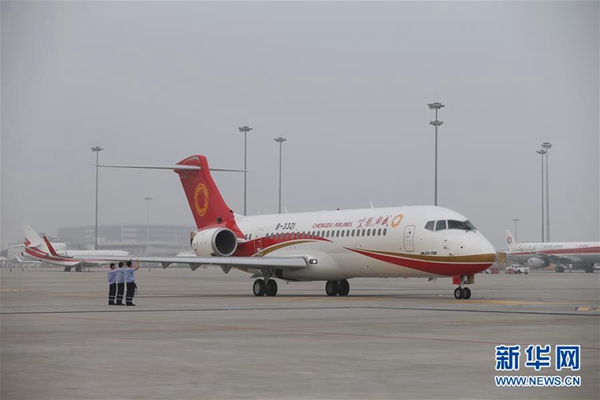Chengdu establishes offshore overseas talent base in US
An economic development zone in Chengdu, capital of southwest China’s Sichuan Province, has established an offshore overseas talent base in San Diego, the United States.
The move brings Chengdu’s number of overseas offshore talent bases to 13, the Chengdu Hi-tech Industrial Development Zone said Tuesday.
The talent base will work with the influential Sino-America Biotechnology and Pharmaceutical Professional Association and U.S. diagnostic company GIMDX to recruit top global talent.
Chengdu is attempting to compete with larger cities closer to the coast, including Beijing, Shanghai, Guangzhou and Shenzhen, by offering more generous terms and a better environment.
In 2016, the hi-tech zone planned to invest 5 billion yuan (730 million U.S. dollars) to establish offshore overseas talent bases as well as create mass entrepreneurship spaces and offshore incubators, in a bid to attract talent and enhance competitiveness in science and technology.
It also seeks to strengthen cooperation with global innovation hubs such as Silicon Valley in the Unites States, Tel Aviv in Israel and Sophia Antipolis in France.
So far, the zone has attracted five Nobel Laureates, hundreds of top employees worldwide as well 115 Fortune Global 500 companies.
In 2016, the zone’s gross industrial output was nearly 390 billion yuan, only behind Beijing’s Zhongguancun Science Park and Shanghai’s Zhangjiang Hi-tech Park.
The battle for Mosul
We have been told regularly by the BBC that Mosul has been recaptured from ISIL. They did that story again over the week-end.
Like most people I condemn ISIL for the tyranny it exerts on communities it infiltrates or conquers, for its brutality and its treatment of subject peoples. If they are now defeated in Mosul that could be a precondition for something better. Mosul rests at the northern top of Iraq, near the head of the Tigris valley to the south with its richer agricultural lands. The issues now are what price victory, and what political settlement will follow?
The pictures from near the front line show that most buildings are either damaged or demolished by the heavy firepower used to kill or clear ISIL fighters from the city. The economic work of the city has been destroyed for the time being, and many people have fled the violence and the lack of basic services needed for a normal life. Restoration will require immediate recovery to put in an electricity and water supply and start to recreate functioning shops, food supply and the other urgent needs. It will take time to tempt people back and help them rebuild.
Assuming the government of Iraq has both the capacity and the will power to initiate this work there can be some recovery. The central question is how can they ensure in future that ISIL or similar terrorist and extremists groups do not start up all over again? Can they settle a population back in Mosul and find a way of governing which gains sufficient consent to work? The Iraqi civil war has proved to be deep seated, with irreconcilable communities feeling the central government does not speak for them. It has proved to be a polity that allows or nurtures extremism in places where the central government loses control. How that government now behaves as it surveys the rubble of its military victory will determine whether something better can emerge from the bitter fighting.
China begins to mass produce regional jetliner ARJ21-700
|
|
|
A regional jetliner ARJ21-700 is ready to take off. [File Photo/Xinhua] |
A Chinese aircraft manufacturer has been certified to mass produce the country’s home-grown regional jetliner ARJ21-700.
The Commercial Aircraft Corp. of China (COMAC) said it obtained the production license from the General Administration of Civil Aviation on Sunday.
The company plans to deliver five ARJ21-700 jetliners by the end of this year.
COMAC has received orders for 413 ARJ21-700 from 19 clients.
Its first aircraft, with 90 economy seats, was delivered to Chengdu Airlines in late 2015. It has so far transported 15,000 passengers, the company said.
China has in recent years sped up efforts to build its commercial aircraft. Besides ARJ21-700, COMAC has also made much larger jet C919, a narrow-body jumbo designed to rival Airbus’ updated A320 and Boeing’s new generation B737.
It has also set up a joint venture with a Russian state company to build wide-body passenger jets.
Commissioner Moscovici’s introductory remarks at the Eurogroup press conference
Je commencerai par les discussions qui ont eu lieu sur le secteur bancaire.
Comme l’a dit Jeroen, Valdis Dombrovsksis a présenté la position de la Commission avec Margrethe Vestager qui est venue expliquer les récentes décisions prises sur les banques italiennes.
Tout a été dit par le Président.
Pour moi, j’ajouterais qu’il est essentiel de retenir trois choses:
D’abord, c’est que des décisions ont été prises qui mettent fin à l’incertitude qui pesait sur le secteur bancaire et donc sur l’économie italienne. Et c’est une bonne nouvelle pour économie italienne.
Deuxièmement, il faut mesurer ce que cela représente, ces transactions enlèvent d’un seul coup environ 13% des prêts improductifs du secteur bancaire italien, ce qui est là encore très positif pour la solidité du secteur et pour sa capacité à fournir du crédit à l’économie réelle.
La troisième, c’est que quoi qu’on en dise, les décisions ont été prises suivant les règles de l’union bancaire, qui sont des règles efficaces mais aussi intelligentes.
Nous avons agréé un cadre commun qui nous a permis de prendre des décisions rapides, de façon ordonnée, dans l’intérêt général, en sauvegardant la stabilité financière et en évitant des développements négatifs qui auraient pu avoir un impact difficile en particulier sur l’économie de certaines régions.
Donc je pense là que nos règles ont fait la preuve de leur efficacité et l’union bancaire aussi.
Nous avons ensuite eu une première discussion sur la réforme de notre union économique et monétaire, suite à la publication de notre “reflection paper” le 31 mai. C’était la première discussion, ce ne sera pas la dernière – la prochaine aura lieu en effet à Tallinn et cela sera aussi dans le format ECOFIN, ce qui est important parce que ce sont des décisions qui sont à prendre à 19, mais aussi à 27. Il était très important que nous ayons commencé à échanger à ce sujet au niveau de l’Eurogroupe, parce qu’il n’y a pas de temps à perdre. Nous le savons tous, il y a une fenêtre d’opportunité qui s’est ouverte, qui s’ouvrira encore d’avantage à l’automne mais comme toute fenêtre d’opportunité, si on la saisit pas, elle se fermera. Donc il faut lancer le débat maintenant.
Sans entrer dans les détails de ce qui a été dit, je crois franchement que la discussion a été très positive. Elle a montré surtout une chose, c’est qu’il y a une détermination à avancer dans l’avenir proche, parce que – même si on doit reconnaître qu’il existe des divergences de vue – le moment pour agir est maintenant – disons, je ne sais pas si c’est dans les six, douze, ou dix-huit mois – mais maintenant.
Comme je l’ai dit à plusieurs reprises, il faut avancer pour jeter les bases d’une zone euro plus forte, plus stable, plus équilibrée, plus égale, fabriquant la convergence économique, mieux gouvernée, bref, plus capable de créer de la croissance et de la prospérité pour tous ses citoyens. Et j’ai eu le sentiment que même avec les différences que j’ai évoquées, le papier de la Commission a été considéré comme utile par tous. Certains y ont été plus favorables que d’autres mais au total, il y avait cette utilité.
***
We had also a good discussion this afternoon with Niels Thygesen, the Chair of the European Fiscal Board on the euro area fiscal stance for 2018.
What matters here is that we strike the right balance between putting debt on a sustainable path and supporting the recovery, which is strengthening but remains characterised by low inflation, limited wage growth and a persistent investment gap. That is why from my side, I think that speaking of “expansion” rather than “recovery” might be a little bit too early. We still have a demand problem. But that is not a theoretical debate, but obviously, our recovery is now strong and solid. And that calls for a neutral, broadly neutral fiscal stance in 2018.
What is key is that Member States design their fiscal policies in a way that reflects their specific situation.
That means that those countries which do not have fiscal space, and especially those that are still in the EDP, should proceed with fiscal consolidation at an appropriate pace, and in particular, they should comply with the relevant Council recommendations.
And it also means that those countries with fiscal space, those that have achieved or are indeed overachieving their Medium-Term Objectives, should use those resources to support demand and in particular investment. That’s the way this broadly neutral fiscal stance could be and should be established.
I also presented very briefly today our latest Post-Programme Surveillance assessment of Ireland, together with the other institutions. Our overall message is that the outlook for the Irish economy remains bright, though there are of course some significant external risks. That is why it is as important as ever to pursue a prudent fiscal policy, and I believe the Irish government – I met this morning with the new Irish minister, Paschal Donohoe – is firmly committed to doing precisely that.
***
Enfin, il faut dire que cette réunion a été importante pour ce dont elle n’a pas parlé: c’est-à-dire la Grèce. Je n’ai pas beaucoup de souvenirs de réunions de l’Eurogroupe sans la Grèce sur son agenda. Ce qui veut dire que la deuxième revue s’est formellement conclue avec la décision de vendredi dernier. Je remercie le Président et tous ceux qui ont participé, de procéder à un déboursement important de 8,5 milliards, dont 7,7 milliards tout de suite. C’est une très bonne nouvelle et c’est aussi la récompense plus que méritée pour un pays et pour un peuple qui font des efforts, des sacrifices, des réformes. Et je pense vraiment qu’avec cette décision, comme avec l’état d’esprit qui préside à l’Eurogroupe, que Jeroen a animé, développé, c’est le chapitre de la reprise, de la confiance, de l’investissement et de l’emploi qui peut désormais s’ouvrir en Grèce. Et si j’osais dire, le moins nous en parlerons à l’Eurogroupe, le meilleur signe ce sera pour l’avenir.

